Politics
/ArcaMax

FBI questions whether Trump's ear was directly hit by bullet
There’s no doubt an attempted assassin’s bullet whizzed by former President Donald Trump’s head and left him with a bloody ear during a July 13 rally in Pennsylvania. But the FBI says it’s unsure the Republican candidate suffered a direct gunshot wound.
Earlier in the week, FBI director Christopher Wray testified before the House ...Read more
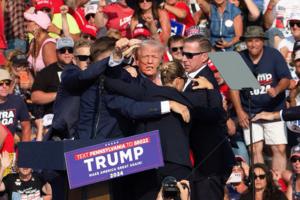
Donald Trump says he'll return to Butler, Pa., for a rally honoring Corey Comperatore
PHILADELPHIA — Former President Donald Trump plans to return to Butler, Pennsylvania, for another rally, he wrote in a Truth Social post Friday — nearly two weeks after a 20-year-old Pennsylvania man attempted to assassinate the former president, killing one rallygoer and injuring two others.
In his post, Trump said his forthcoming Butler ...Read more

Trump greets Netanyahu warmly at Mar-a-Lago after White House friction
Donald Trump gave Prime Minister Benjamin Netanyahu the warm welcome he was hoping for at Mar-a-Lago on Friday after the Israeli got a thinly veiled rebuke from presidential candidate Kamala Harris in Washington.
Trump greeted Netanyahu and his wife, Sara, at the top step of the gilded foyer at his Florida estate and criticized Harris’ ...Read more

Trump greets Netanyahu warmly on day after Harris pressed him for war's end
Prime Minister Benjamin Netanyahu got a warm greeting Friday from Donald Trump at the start of their meeting in Florida, less than a day after the Israeli leader received a not-so-veiled rebuke from presidential candidate Kamala Harris in Washington.
“I’m honored, come on in,” Trump said as he greeted Netanyahu and his wife, Sara, at the ...Read more
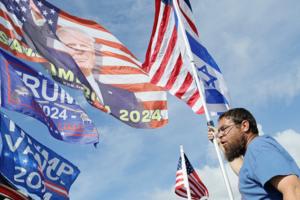
Sparse crowd, some demonstrators greet Netanyahu on his visit with Trump at Mar-a-Lago
WEST PALM BEACH, Fla. — Sparse groups of supporters sporting campaign colors and bearing an occasional Israel flag lined Southern Boulevard along the route to Mar-a-Lago Friday morning ahead of a highly anticipated meeting between Republican presidential candidate Donald Trump and Israeli Prime Minister Benjamin Netanyahu.
A group of about 50...Read more
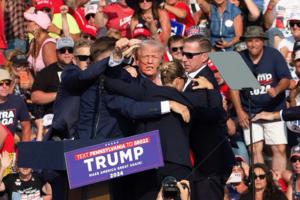
Donald Trump's Harrisburg rally next week is his first time back in Pa. since the assassination attempt
PHILADELPHIA — Former President Donald Trump will return to Pennsylvania next week for the first time since he survived an assassination attempt in Butler earlier this month.
Trump will hold an indoor rally Wednesday evening in Harrisburg at the Pennsylvania Farm Show Complex. The Secret Service has encouraged the Trump campaign to stop its ...Read more
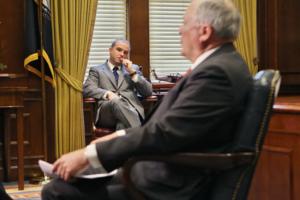
How Biden's withdrawal upended the Georgia race
ATLANTA — Just before he dropped out of the race, President Joe Biden called former Atlanta Mayor Keisha Lance Bottoms to check in. She thought he sounded “strong” and committed to the matchup against Donald Trump. Her husband, Derek, thought otherwise.
“I think he’s getting out,” he told his disbelieving wife, one of Biden’s most...Read more
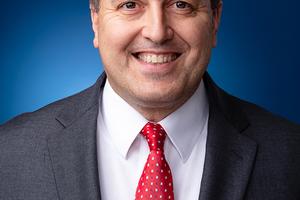
Missouri GOP governor candidates rip Chiefs funding, embrace Christian nationalism in debate
KANSAS CITY, Mo. — Two of the top Republican candidates for Missouri governor during a debate that aired Thursday rejected the idea of public funding to keep the Kansas City Chiefs in the state and entertained freeing the first Kansas City police officer convicted for killing a Black man.
They also embraced Christian nationalism.
Secretary ...Read more
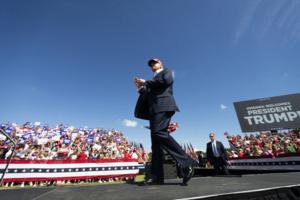
Police investigate after cases dismissed while officer worked at Trump rally in Virginia
It was a Friday morning in Chesapeake traffic court, and the room was full of people who’d been cited for things like speeding, ignoring traffic signals, having an expired license and driving while intoxicated.
District Judge Erin Evans-Bedois had an announcement to make at the start of the June 28 court session, according to two attorneys ...Read more
Massive veterans budget gap rips hole in appropriations process
WASHINGTON — The Department of Veterans Affairs is facing a nearly $15 billion combined budget shortfall this fiscal year and next, and congressional Republicans are crying foul at the last-minute notification about a funding crisis lawmakers have little time to try to fix.
VA officials told lawmakers on July 15 that the agency needs $2.9 ...Read more
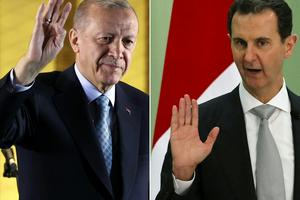
Anti-Syrian violence in Turkey complicates normalization process between Turkey and Syria
Chances of a rapprochement between regional rivals Turkey and Syria were raised momentarily on July 22, 2024, with news that the leaders of both countries were set for a much-anticipated meeting aimed at resolving long-standing differences. Within hours, Turkish sources dismissed the rumors of an imminent sit-down between the two leaders as ...Read more
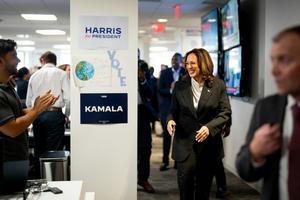
Kamala Harris is no Hubert Humphrey − how the presumed 2024 Democratic presidential nominee isn’t like the 1968 party candidate
Staring straight at the camera, with a grave expression on his face, the president uttered these famous words: “I shall not seek, and I will not accept, the nomination of my party for another term as your president.”
Lyndon Johnson made that announcement at the end of his nationally televised address on the Vietnam War on March 31...Read more
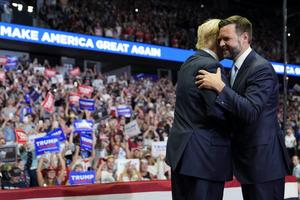
JD Vance’s selection as Trump’s running mate marks the end of Republican conservatism
Since Donald Trump chose Ohio Sen. JD Vance as his running mate, it’s been widely noted that Vance once described Trump as “reprehensible” and “cultural heroin.” However, the day after Vance won his own Senate race in 2022, he reportedly made it known that he would support Trump for president in 2024.
Given this dramatic ...Read more
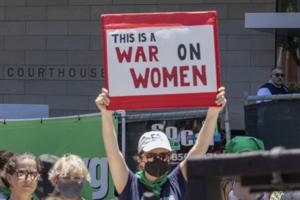
Editorial: Don't be fooled by Trump's and Republicans' abortion myths
Abortion opponents peddle various myths about the procedure to discredit it and demonize the people who provide or support it. Abortion is healthcare. The earlier it is available, the easier it is for people to make choices about their bodies that will affect the rest of their lives. But during election season, expect to hear some or all of ...Read more
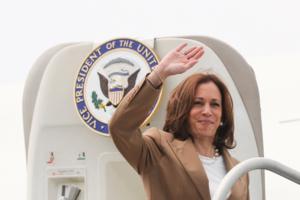
Trump won't commit to debate until Harris formally nominated
WASHINGTON — Donald Trump’s campaign refused to commit to a debate with Kamala Harris after the Democratic candidate challenged the Republican nominee to show up to a previously scheduled face-off.
Trump spokesman Steven Cheung said Thursday night that debate plans “cannot be finalized until Democrats formally decide on their nominee.”...Read more
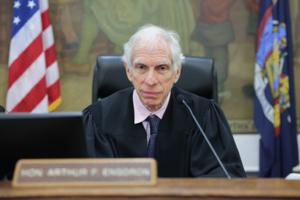
Judge Engoron won't step down from Donald Trump civil fraud case
NEW YORK — The judge presiding over Donald Trump’s civil fraud lawsuit on Thursday categorically rejected the former president’s request that he step down based on allegations he improperly discussed the case with a lawyer in passing — saying the attorney in question “accosted and started haranguing” him at the courthouse.
State ...Read more
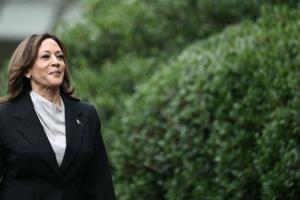
Harris, Trump take fresh aim at each other as presidential race enters post-Biden phase
Vice President Kamala Harris and former President Trump entered a new phase of the presidential race on the morning after an Oval Office speech in which President Biden bowed out — each taking new aim at the other as they sprint toward November.
During a Thursday morning conversation on the Republican-friendly “Fox and Friends,” Trump ...Read more
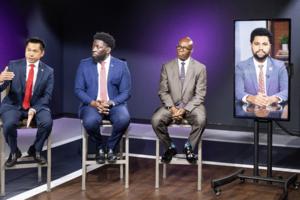
Florida District 10 congressional candidates debate immigration, abortion and other key issues
ORLANDO, Fla. — The candidates for Central Florida’s congressional District 10 argued about marijuana, immigration, abortion and other issues in a pitch to represent their party in November’s general election during a televised forum that aired Thursday night.
District 10 includes much of central and eastern Orange County including ...Read more
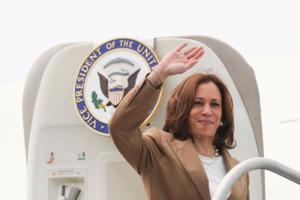
Harris says she'll debate Trump after Republican balked at host
WASHINGTON — Kamala Harris said she would debate Donald Trump and accused her Republican opponent of trying to back out of a previously scheduled face-off in September.
“I am ready to debate Donald Trump,” the vice president told reporters Thursday upon returning to Washington from a speech in Houston. “Now it appears that he’s ...Read more
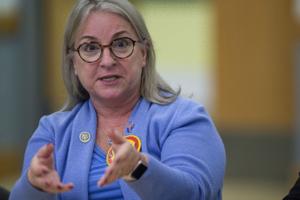
Pa. congressional candidates Susan Wild, Ryan Mackenzie agree to debate; dates and times unclear
ALLENTOWN, Pa. — Lehigh Valley area congressional candidates Susan Wild and Ryan Mackenzie both are willing to debate each other on key issues ahead of the November election, but the exact time, place and location of the events are unclear.
According to a news release from Mackenzie’s campaign, he has agreed to two proposed debates with ...Read more
Popular Stories
- Harris says she'll debate Trump after Republican balked at host
- Trump won't commit to debate until Harris formally nominated
- Harris, Trump take fresh aim at each other as presidential race enters post-Biden phase
- Florida District 10 congressional candidates debate immigration, abortion and other key issues
- Editorial: Don't be fooled by Trump's and Republicans' abortion myths





